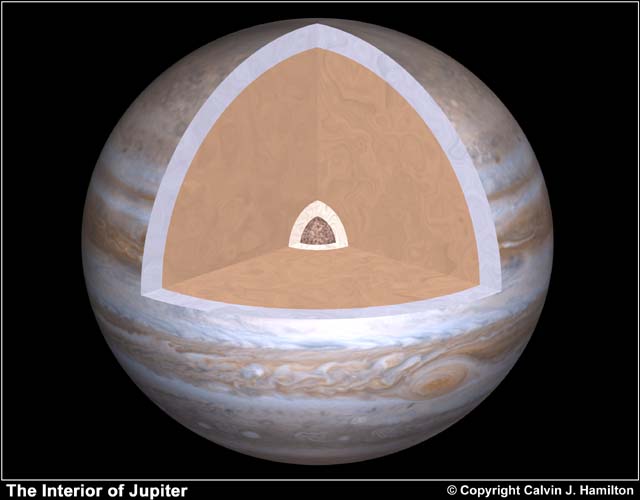"Ground" on Jupiter?
"Ground" on Jupiter?
Is there any sort of solid "ground" in a gas giant like Jupiter? I've wondered this all my life and I don't know why it's taken me so long to ask someone. If, hypothetically, a humongous lead ball (or some other durable object) were dropped on Jupiter, what would happen to it?
-
PlutonianEmpire

- Posts: 1374
- Joined: 09.09.2004
- Age: 40
- With us: 20 years 2 months
- Location: MinneSNOWta
- Contact:
Re: "Ground" on Jupiter?
Nick wrote:Is there any sort of solid "ground" in a gas giant like Jupiter? I've wondered this all my life and I don't know why it's taken me so long to ask someone. If, hypothetically, a humongous lead ball (or some other durable object) were dropped on Jupiter, what would happen to it?
It would be crushed by the titanic pressures of the uber dense atmosphere.
Terraformed Pluto: Now with New Horizons maps! :D
-
julesstoop
- Posts: 408
- Joined: 27.03.2002
- With us: 22 years 7 months
- Location: Leiden, The Netherlands
I don't believe lead will be crushed to anything much more dense in Jupiters atmosphere. Lead is pretty dense by itsself.
I can however imagine that once deep enough into Jupiter, temperatures are high enough to 'burn' the lead. In other words, it might react with another substance to create something else.
I can however imagine that once deep enough into Jupiter, temperatures are high enough to 'burn' the lead. In other words, it might react with another substance to create something else.
Lapinism matters!
http://settuno.com/
http://settuno.com/
-
eburacum45
- Posts: 691
- Joined: 13.11.2003
- With us: 21 years
Lead and hydrogen wouldn't react under any temperatures and pressures I am aware of; so at least part of a large lump of lead dropped into Jupiter would probably reach the surface whatever that is.
But what is the surface like?
This page shows one good model;
http://www.solarviews.com/cap/jup/jupint.htm

So you would hit an ocean of liquid metallic hydrogen first, then a layer of water and other ices; finally a rocky core.
Since the centre of Jupiter is hot, thanks to gravitational collapse, the rocky core might be partly semisolid; but I think that it will be solid (like the Earth's inner core) because of the fantastic pressure.
But what is the surface like?
This page shows one good model;
http://www.solarviews.com/cap/jup/jupint.htm

This picture illustrates the internal structure of Jupiter. The outer layer is primarily composed of molecular hydrogen. At greater depths the hydrogen starts resembling a liquid. At 10,000 kilometers below Jupiter's cloud top liquid hydrogen reaches a pressure of 1,000,000 bar with a temperature of 6,000?° K. At this state hydrogen changes into a phase of liquid metallic hydrogen. In this state, the hydrogen atoms break down yeilding ionized protons and electrons similar to the Sun's interior. Below this is a layer dominated by ice where "ice" denotes a soupy liquid mixture of water, methane, and ammonia under high temperatures and pressures. Finally at the center is a rocky or rocky-ice core of up to 10 Earth masses.
So you would hit an ocean of liquid metallic hydrogen first, then a layer of water and other ices; finally a rocky core.
Since the centre of Jupiter is hot, thanks to gravitational collapse, the rocky core might be partly semisolid; but I think that it will be solid (like the Earth's inner core) because of the fantastic pressure.
-
GlobeMaker
- Posts: 216
- Joined: 30.10.2005
- With us: 19 years
I tried to calculate the compressibility related change in volume
of iron in a core of Jupiter. I looked up tables of compressibility
of many materials that may be in a solid core of Jupiter. The tables
list the compressiblities of solids versus pressure. The pressures
inside Jupiter are off these charts! If I extrapolated the charts to
Jupiter's pressures, the calculated volumes for an object would
become negative volumes. So my best guess is that one cubic
meter of iron or lead could be compressed into a volume that is
surprisingly small, like 1/10 cubic meter.
of iron in a core of Jupiter. I looked up tables of compressibility
of many materials that may be in a solid core of Jupiter. The tables
list the compressiblities of solids versus pressure. The pressures
inside Jupiter are off these charts! If I extrapolated the charts to
Jupiter's pressures, the calculated volumes for an object would
become negative volumes. So my best guess is that one cubic
meter of iron or lead could be compressed into a volume that is
surprisingly small, like 1/10 cubic meter.
Your wish is my command line.
-
julesstoop
- Posts: 408
- Joined: 27.03.2002
- With us: 22 years 7 months
- Location: Leiden, The Netherlands
The problem with your method is that I suspect that extrapolating those values wil not yield a realistic result.
Regarding the original question, I suppose lead will lose it's electrons as well and it might just dissolve in this metalic hydrogen plasma (a liquid metal is somewhat like a plasma)
Regarding the original question, I suppose lead will lose it's electrons as well and it might just dissolve in this metalic hydrogen plasma (a liquid metal is somewhat like a plasma)
Lapinism matters!
http://settuno.com/
http://settuno.com/
-
eburacum45
- Posts: 691
- Joined: 13.11.2003
- With us: 21 years
